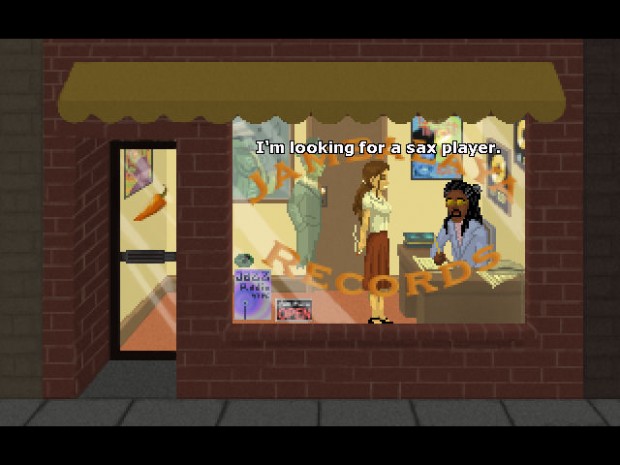 The 1970s, an era of sex, drugs and—wayward ghosts.
The 1970s, an era of sex, drugs and—wayward ghosts.
Wadjet Eye Games’ Blackwell Series, brainchild of company owner Dave Gilbert, continues with “Blackwell Unbound,” prequel to the 2006 Adventure Game Studio(AGS) award winner for best character art, “Blackwell Legacy,” and 2007 AGS winner of best music (nominee for best story), itself. It was recently re-mastered and re-released in the “Blackwell Trilogy” bundle with both Legacy and “Blackwell Convergence,” the sequel to both Legacy and Unbound.
How was a spirit medium’s life in ’70s New York? Just like the ’00s, but without anything to make spirit investigations remotely easy—except for a copious amount of virtual cigarette smoke, that is.
Here’s the skinny:
The story takes a big jump back to 1973 and follows Lauren Blackwell, Rosangela Blackwell’s aunt and guardian, whose ashes were spread by Rosangela at the beginning of Legacy. She was identified, in the previous game, as a chronically comatose psychopath shacked up in Bellevue Hospital before her tragic death. Apparently, she wasn’t always a babbling maniac.
Lauren, on the surface, is the very model of the traditional, angst-ridden private-eye trope (in a red skirt) with an obvious proclivity towards dark sarcasm, manic depression and chain-smoking. The chain-smoking, in particular, seems to be a running theme in Unbound. In fact, the words “cigarette,” “smoke” and “ashtray” appear over twenty times in the first scene alone, if the player takes a moment to click around Lauren’s apartment and hear all of the dialogue.
We get it. She smokes.
She’s inherently more down-to-earth than the socially awkward Rosangela and shows it with her infectiously catty attitude. She’s also probably New York City’s first modern hipster, mentioning her thrift store-bought coat hanging in her apartment with a modicum of indie pride. Of course, she still holds the company of the quintessential, fedora-clad gumshoe spirit guide Joey Mallone, the Blackwell family heirloom, so to speak. Nevertheless, the duo’s dynamic is more sardonic and flirty than with Rosangela, befitting Lauren’s racy and hard-boiled personality. Sometimes, it seems borderline romantic, but you can’t get much more star-crossed than ghost romance.
Just ask Sam Wheat.
Unbound attempts to keep it authentically ’70s by adding little tidbits of period Americana like Farah Fawcett posters on the walls, smooth-talking musicians and, of course, the complete and utter lack of all of the internets. As such, the player has to resort to pre-Information Age tricks of the detective trade—like checking the Yellow Pages for phone numbers and addresses, toting around a Polaroid camera and tape recorder, and using a very non-mobile corded rotary phone to call leads. These limitations are, surprisingly, much more entertaining than they sound, as they add to the game’s subtle immersion into the time period.
The feel of NYC is discernibly shifted, in this prequel, to a much more gritty and unwelcoming atmosphere, befitting the time before Mayor Giuliani’s crime and homeless crackdown in the ’90s. Like the previous game, it features recognizable city landmarks like the Roosevelt Island promenade, with a view of the Queensboro Bridge, and the New Yorker Magazine HQ, in keeping with the paranormal-but-grounded-in-realism plot. Also, as an added bit of NYC historical trivia, interaction with the late Joseph Mitchell, real-world writer for the “New Yorker” magazine from 1964 to his death in 1996, is included as a main plot element.
When it comes to the gameplay, Chris Jones, Game Engine Designer, doesn’t make that many changes to the basic Blackwell formula of simple and functional point-and-click adventuring, which is great. However, Joey is now a controllable character allowing for some creative puzzle solving, and teamwork, between the medium and her faithful spirit.
Apparently, the game was originally meant to be little more than short flashbacks during Convergence. Gilbert decided to scrap that idea and make two completely separate games. This would explain the lack of “talking portraits” on the screen during all character dialog except the director commentary (basically a talking Dave Gilbert head in the middle of the screen), which seems like a cut corner.
The music, provided by Thomas Regin, is much more sultry and jazzy than the previous game, Blackwell Legacy, with haunting piano and meaty sax numbers that flow with a fair amount of sophisticated gravitas; As such, the atmosphere is discernibly more creepy and noir.
The game’s story, itself, is much more raw with palpable, brooding danger as you sleuth a pair of tragic phantoms, dead from curiously unnatural causes. The occasionally awkward voice acting holds its own, giving way to deep, emotional vignettes of the various spectral “clients,” Joey and the reluctant protagonist, herself.
Abe Goldfarb fantastically reprises his role as Joey. No complaints here. Lauren, voiced by Dani Marco, is almost perfect as well, if not a little too bored-sounding at times, considering the faster-paced context of certain scenes. The rest of the vocal cast, like the previous game, was hit or miss (but mostly hit) varying wildly from moment to moment, but even the “bad” was tolerable enough to be ignored. Honorable mention goes to Francisco Gonzalez, however, for what has to be the most offensively bad faux-Jamaican accent in the history of the world since Dave Chapelle in “Half Baked.”
Unbound, like Legacy, is the type of game that keeps on giving, even after it’s finished, with concept art, director commentary, staff interviews and a plethora of other special little Easter eggs. The player will be delighted with achievements for minor story variables including, of course, the clever “Medium Well Done” award for completing the whole game, just like in Legacy.
All in all, the game improves upon the already fantastic Blackwell Legacy, and adds an interesting group of characters to the mix that really fleshes out some back-story. It has an almost painfully classy style that’s sure to provide hours of amusement to the noir adventure fan.

Leave a Reply